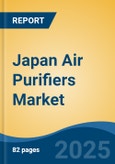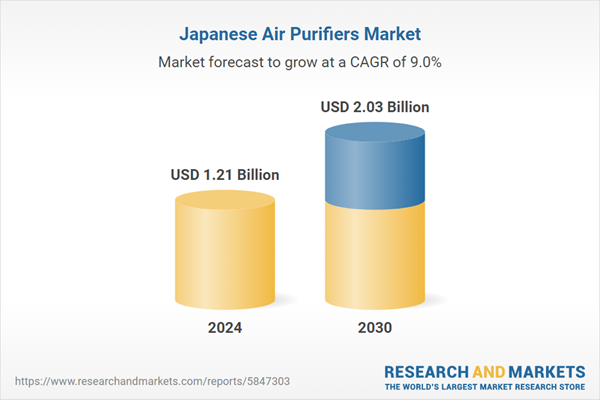Speak directly to the analyst to clarify any post sales queries you may have.
10% Free customizationThis report comes with 10% free customization, enabling you to add data that meets your specific business needs.
Key Market Drivers
Rising Air Pollution Level Across the Region
The increasing levels of air pollution in Japanese urban centers are a major factor boosting demand for air purifiers. Despite decades of environmental regulation, cities like Tokyo still report elevated levels of particulate matter (PM2.5), nitrogen oxides, and sulfur oxides. According to a 2023 study, Tokyo’s PM2.5 concentrations exceeded the World Health Organization's recommended threshold by nearly double. Prolonged exposure to such pollutants raises the risk of chronic respiratory and cardiovascular issues, prompting health-conscious consumers to seek indoor air purification solutions. Advanced air purifiers featuring HEPA and activated carbon technologies are being widely adopted to mitigate pollution-related health risks. This growing health awareness is expected to keep driving demand for effective air purification systems throughout Japan.Key Market Challenges
Intense Competition Among Local & International Brand
The Japan air purifier market faces strong competitive pressure due to the presence of both domestic and international players. Established Japanese brands like Sharp, Panasonic, and Daikin enjoy strong consumer trust and market penetration. Meanwhile, global brands such as Dyson, Honeywell, and Philips are actively expanding their footprint with innovative, high-performance offerings. This competitive intensity has led to pricing pressure and constant product innovation, as each brand seeks to differentiate itself through advanced features and design. The broad range of available products can lead to consumer indecision, further complicating brand positioning. Local brands must innovate to retain market leadership, while foreign players need to adapt their offerings to suit Japanese consumer preferences and living environments.Key Market Trends
Expansion of E-Commerce Platform
E-commerce is emerging as a powerful channel in Japan’s air purifier market. The convenience of comparing features, reading customer reviews, and accessing a wider variety of brands and models has made online platforms a preferred purchasing method for many consumers. Accelerated by the pandemic, online shopping habits have become more ingrained, with air purifiers among the products seeing increased online demand. E-commerce platforms offer everything from entry-level to high-end air purifiers, making the segment accessible to a broad demographic. The convenience of home delivery, competitive pricing, and diverse payment options continue to drive this trend, prompting both domestic and international manufacturers to enhance their digital presence.Key Players Profiled in this Japan Air Purifiers Market Report
- Sharp Corporation
- Koninklijke Philips N.V.
- Panasonic Holdings Corporation
- Daikin Industries, Ltd
- Hitachi, Ltd
- Mitsubishi Electric Corporation
- Dyson Holdings Pte Ltd
- Honeywell International Inc
- Breathify Inc
- Blueair Inc
Report Scope:
In this report, the Japan Air Purifiers Market has been segmented into the following categories, in addition to the industry trends which have also been detailed below:Japan Air Purifiers Market, by Filter Type:
- High-Efficiency Particulate Air Filters
- Activated Carbon Filters
- Ultraviolet Light Filters
- Ionizer Air Purifiers
Japan Air Purifiers Market, by Category:
- Portable
- Fixed
Japan Air Purifiers Market, by End User:
- Residential
- Commercial
Japan Air Purifiers Market, by Distribution Channel:
- Online
- Offline
Japan Air Purifiers Market, by Region:
- Hokkaido & Tohoku
- Chubu
- Chugoku
- Kyushu
- Rest of Japan
Competitive Landscape
Company Profiles: Detailed analysis of the major companies present in the Japan Air Purifiers Market.Available Customizations:
With the given market data, the publisher offers customizations according to a company's specific needs. The following customization options are available for the report.Company Information
- Detailed analysis and profiling of additional market players (up to five).
This product will be delivered within 1-3 business days.
Table of Contents
Companies Mentioned
The leading companies profiled in this Japan Air Purifiers market report include:- Sharp Corporation
- Koninklijke Philips N.V.
- Panasonic Holdings Corporation
- Daikin Industries, Ltd
- Hitachi, Ltd
- Mitsubishi Electric Corporation
- Dyson Holdings Pte Ltd
- Honeywell International Inc
- Breathify Inc
- Blueair Inc
Table Information
| Report Attribute | Details |
|---|---|
| No. of Pages | 82 |
| Published | May 2025 |
| Forecast Period | 2024 - 2030 |
| Estimated Market Value ( USD | $ 1.21 Billion |
| Forecasted Market Value ( USD | $ 2.03 Billion |
| Compound Annual Growth Rate | 9.0% |
| Regions Covered | Japan |
| No. of Companies Mentioned | 11 |









